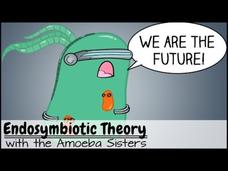Amoeba Sisters
Food Webs and Energy Pyramids: Bedrocks of Biodiversity
Explore food chains, food webs, energy pyramids, and the power of biodiversity in this ecology video by the Amoeba Sisters! This video also introduces general vocabulary for the unit of ecology.
Amoeba Sisters
Dichotomous Keys: Identification Achievement Unlocked
Join the Amoeba Sisters in discovering how to use a dichotomous key to identify organisms. This video also touches on the importance of scientific names. Table of Contents: Intro 00:00 What is a Dichotomous Key? 0:29 Scientific Names vs....
Amoeba Sisters
Autotrophs and Heterotrophs
Curious about modes of nutrition? Join the Amoeba Sisters in learning about autotrophs and heterotrophs. Video explains these terms as well as how their carbon source differs. Photoautotrophs, photoheterotrophs, chemoautotrophs, and...
Crash Course
Taxonomy: Life's Filing System - Crash Course Biology
Hank tells us the background story and explains the importance of the science of classifying living things, also known as taxonomy.
Professor Dave Explains
Energy Flow and Nutrient Cycling in Autotrophs and Heterotrophs
The biosphere is an extremely dynamic system, with energy flowing from one group of organism to another at all times. How does this flow operate? How do nutrients cycle? What is biomass? What are gross and net primary productivity? Let's...
Visual Learning Systems
The Origins and Early Evolution of Life on Earth
This video provides a brief overview of the early stages of life on Earth, highlighting the importance of organic compounds in the early oceans and the role they played in the development of the first living cells. It also discusses the...
Visual Learning Systems
Exploring the Kingdom of Fungi
This video aims to provide an overview of fungi, their distinct characteristics, and their significance in various aspects of life. This video is part of the 10-part series, Classifying Plants and Fungi.
Let's Tute
Introduction to Ecosystem Structure and Composition
In this video, we learn about the components of an ecosystem, including biotic (living) and abiotic (non-living) factors. We also learn about the different types of biotic components, including producers, consumers, and decomposers.
Ancient Lights Media
Biological Classification - The Four Kingdoms of Eukarya
Biological Classification Set: This clip introduces the four kingdoms of, Eukarya: Protista, Plantae, Animalia and Fungi.
Visual Learning Systems
Classification and Characteristics of Eubacteria and Archaebacteria
In this video, the topic of discussion is the classification of bacteria, specifically focusing on two distinct kingdoms: eubacteria and archaebacteria. The speaker mentions that scientists do not fully agree on the classification of...
Amoeba Sisters
Endosymbiotic Theory
Eukaryotes—were we born from an act of predation that backfired? Ponder this and other questions of evolution with a video from a well-written biology playlist. Topics include the origins of mitochondria and chloroplasts, unusual...
Teacher's Pet
Introduction to Photosynthesis
Introduce viewers to photosynthesis with a video that begins by explaining the differences between heterotrophs and autotrophs. Then it describes photosynthesis and offers the chemical equation for this process.
Bozeman Science
Fungi
A biology v ideo focuses on the various characteristics of the five major phyla of fungi: ascomycota, basidiomycota, chytridomycota, glomeromycota, and zygomycota.
Bozeman Science
Photosynthesis and Respiration
View how autotrophs and heterotrophs use the energy of the sun to form the energy their cells need, ATP. Learners watch an informative video that details the processes of photosynthesis, learning where it occurs, what...
Amoeba Sisters
Food Webs and Energy Pyramids: Bedrocks of Biodiversity
How come we don't eat worms, but we eat fish that eat worms? A video features the food chain and explains why a food web is a better explanation for biodiversity. It includes explanations of producers, autotrophs, consumers,...





